“The deepest pain in life isn’t losing someone you love—it’s coming to terms with the fact that they were never truly there for you.” Powerful isn’t it? A fake friend can make you question everything—your trust, your instincts, even your worth.
We’ve all been there. That moment when you realize someone you thought was a friend is only in it for themselves. It stings. But here’s the truth: fake friends are a lesson, not a life sentence. They show us what we don’t deserve, and that’s a gift—if we know how to use it.
You’ll find more than 50 fake friends quotes in this article. You’ll uncover the wisdom to spot the red flags, the humor to laugh off the absurdity, and the courage to walk away when you need to. Because life’s too short for shallow connections, let’s dive in.
Table of Contents
Spotting a Fake Friend
At first, fake friends can be masters of disguise. They often present themselves as warm, supportive companions—someone you can count on. However, as time passes, their real motives are revealed. These aren’t just misunderstandings or occasional mistakes; fake friends repeatedly fail to meet the basic standards of trust and respect. They leave you feeling drained, used, and questioning your worth.
So, how can you tell the difference between a genuine friend and a fake one? It starts with paying attention to patterns of behavior. Genuine friends lift you, while fake friends weigh you down. Here are some unmistakable signs of a fake friend:
Red Flags of a Fake Friend:
- They only contact you when they require assistance.
Whether it’s borrowing money, asking for favors, or needing emotional support, their connection feels transactional. - They undermine your achievements.
Instead of celebrating your success, they minimize it or find subtle ways to make you feel less than. A fake friend may dismiss your wins as “no big deal” or shift the focus back to themselves. - They gossip about others—and possibly about you.
Pay attention to how they talk about others. If they’re quick to share someone else’s secrets or missteps, there’s a good chance they’re doing the same behind your back. - Their actions don’t match their words.
Promises are made but never kept. They might say all the right things, but when it’s time to show up—physically, emotionally, or otherwise—they’re absent. - They make you feel small.
Fake friends often chip away at your self-esteem. They may mask their criticisms as “jokes” or “honest feedback,” but the intent feels hurtful rather than helpful.
The Emotional Impact of Fake Friends
Realizing someone you trusted isn’t who they seemed to be can be heartbreaking. It’s not just about losing a friend; it’s about the betrayal of your trust and the emotional exhaustion that follows. You might feel anger, sadness, or even blame yourself—but don’t. Recognizing these toxic behaviors is the first, crucial step to reclaiming your peace and protecting your energy.
The good news? Identifying a fake friend allows you to make room for the people who truly deserve a place in your life—those who uplift, support, and genuinely care about you.
The Pain of Betrayal
Betrayal hurts more than many other injuries, particularly when it comes from someone you once relied on. The pain often arises not just from the act itself, but from the broken expectation of loyalty and care. Fake friends have a way of twisting narratives, making you question your actions, and placing guilt on your shoulders where it doesn’t belong. It’s an emotional rollercoaster—confusion, anger, sadness—all stemming from one undeniable truth: you were let down by someone you thought had your back.
Understanding and processing this pain takes time, but sometimes, the right words can help put those emotions into perspective.
Betrayal quotes
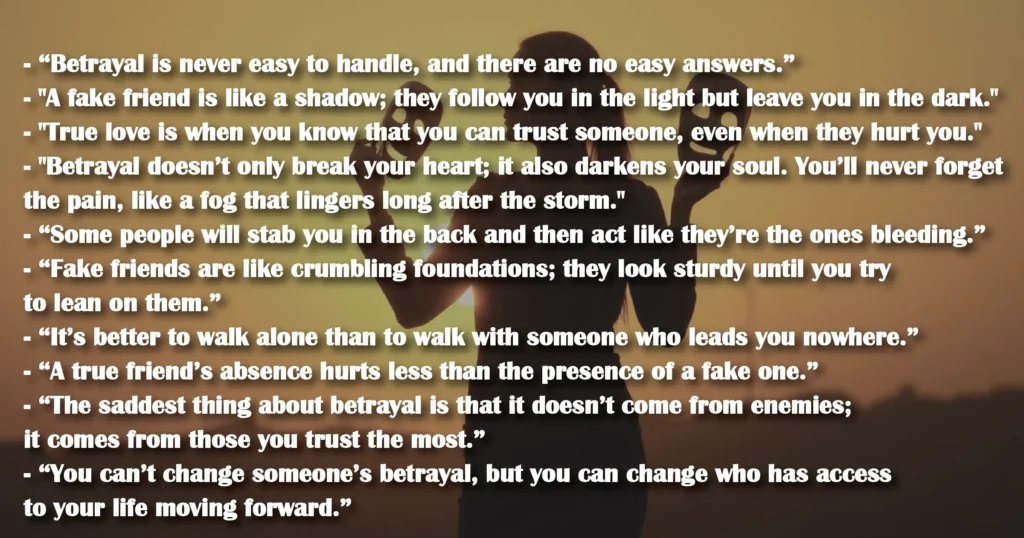
Reflecting on These Betrayal Quotes
Each of these quotes offers a glimpse into the emotional complexity of betrayal and the lessons it brings. They remind us that the pain caused by fake friends isn’t a reflection of our worth but of their inability to value and respect us. The sting of betrayal may linger, but it also teaches resilience and the importance of setting boundaries.
Ultimately, fake friends help us refine our circle, clearing the way for genuine connections. Their betrayal may hurt, but it also allows us to grow, heal, and prioritize relationships that truly enrich our lives.
Moving On From Fake Friends
Letting go of a fake friend isn’t just hard—it can feel like mourning a loss. The memories, the laughs, the shared moments—all of it can make walking away feel impossible. But here’s the truth: keeping toxic people in your life costs you more than you might realize. Moving on isn’t just an act of letting go; it’s an act of reclaiming your peace, your energy, and your self-worth.
Tips for Navigating the Transition
- Accept the reality of the situation.
Denial only prolongs the pain. Acknowledge that the friendship is toxic and no longer serving you. It’s okay to grieve the loss, but don’t romanticize the relationship. - Set boundaries.
Distance yourself physically and emotionally. This isn’t about being cruel; it’s about protecting your peace. Boundaries help create space for healthier relationships to thrive. - Seek support.
Lean on the people who truly have your back—family, true friends, or even a counselor. They can provide the clarity and encouragement you need during this time. - Focus on self-love and growth.
Invest the energy you once gave to a fake friend into yourself. Build your confidence, pursue your passions, and surround yourself with positivity.
Quotes for Moving On
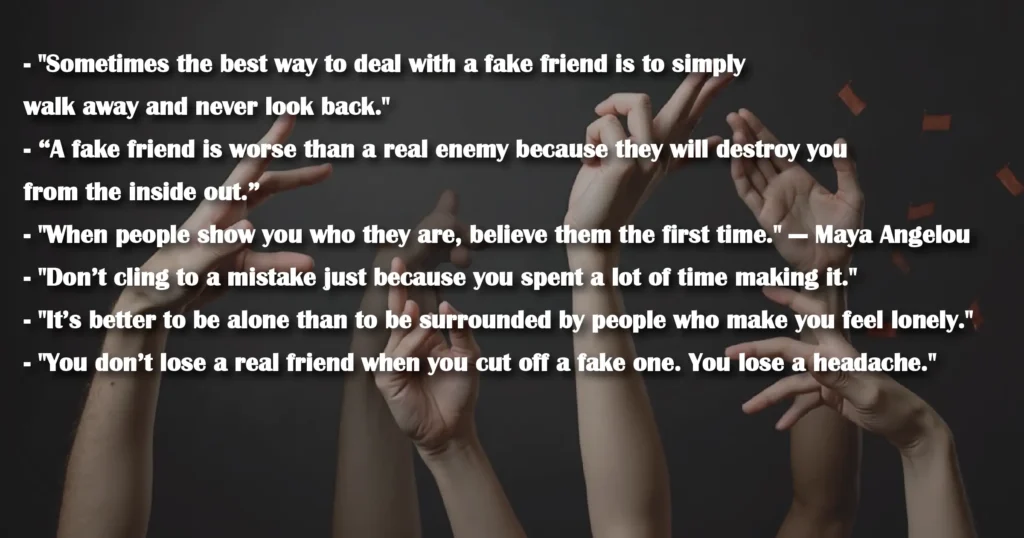
These words resonate because they speak to hard truths we often avoid. They remind us that walking away isn’t a weakness—it’s a strength. It’s about valuing yourself enough to step away from harm, even when it’s cloaked in the guise of friendship. Each quote underscores the power of choosing authenticity and self-respect over the illusion of connection.
So, as you move forward, remember this: you deserve relationships that feel like sunshine, not shadows. Letting go might hurt, but staying in toxic relationships hurts more. Keep these quotes close as a reminder that every step away from fake friends is a step closer to your true self.
Embracing True Friendship
True friendship is one of life’s greatest treasures. It’s the kind of bond that fills your heart, steadies your steps, and helps you weather life’s storms. Real friends are like anchors, keeping you grounded when things feel chaotic, yet encouraging you to chase your dreams. They don’t just show up—they stay.
Qualities of True Friends
Here’s how to recognize the magic of True Friendship:
- They support you, no matter what.
Whether you’re celebrating a victory or struggling through tough times, they’re there—no excuses, no conditions. - They celebrate your successes.
True friends cheer for your wins without a trace of jealousy. They take genuine pride in your happiness and achievements. - They stand by you during failure.
When things fall apart, real friends don’t abandon you. They’re the ones offering a shoulder to cry on and a hand to help you up. - They tell you the truth.
Honesty is a hallmark of true friendship. They care enough to give you constructive feedback, even when it’s hard to hear because they want the best for you. - They respect your boundaries.
Genuine friends honor your needs and limits without guilt-tripping or pushing you for more than you’re able to give.
Quotes on True Friendship
Here are some quotes that beautifully capture the essence of real friendships:
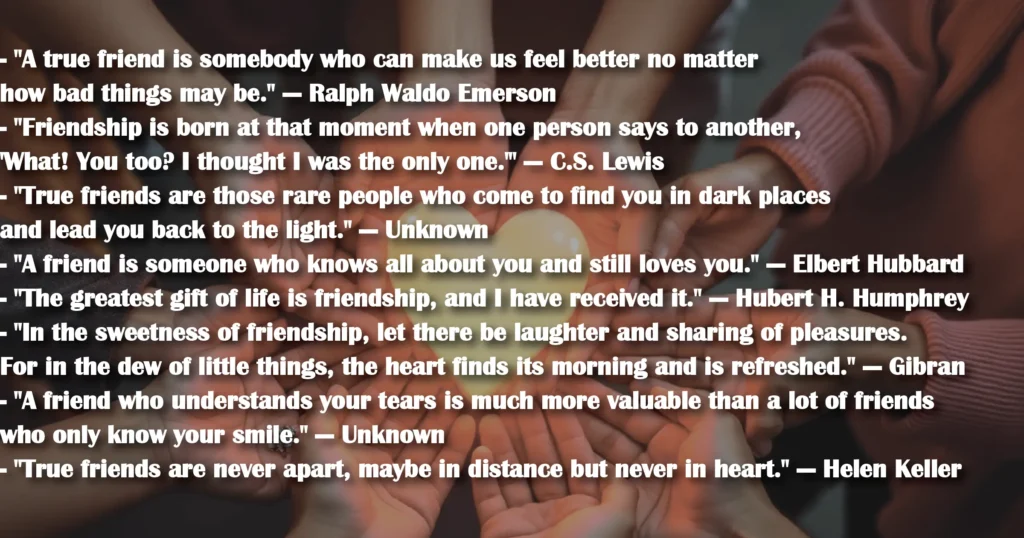
These quotes remind us that real friendship isn’t about quantity but quality. It’s about trust, respect, and a mutual willingness to show up for one another. Genuine friends recognize your imperfections and still accept you with love. They lift you higher and bring out the best in you.
As you reflect on your relationships, ask yourself: Which connections bring joy, peace, and strength into your life? They are the ones to cherish and keep near. True friendship is rare, but it’s worth every effort to find and protect it.
Fake Friends vs. Real Friends
Understanding the difference between fake and real friends is more than just a life lesson—it’s a cornerstone of emotional well-being. Fake friends bring chaos and doubt into your life, often making you feel used, betrayed, or unsupported. On the other hand, real friends are the pillars of trust and love that anchor you in both good times and bad. The distinction is stark, and recognizing it is key to surrounding yourself with the right people.
Traits of Fake Friends:
- Manipulative: They use subtle (or not-so-subtle) tactics to maintain control or gain the upper hand in the relationship.
- Two-faced: They talk behind your back but act kind to your face, leaving you questioning their sincerity.
- Judgmental: Quick to criticize or gossip but slow to lend a helping hand when you need it most.
Traits of Real Friends:
- Present: They show up for you, no questions asked, whether it’s to celebrate your highs or support you through your lows.
- Honest: Real friends tell you what you need to hear, not just what you want to hear, because they genuinely care about your growth.
- Supportive: They don’t compete or envy your success. Instead, they cheer you on and stand beside you in your struggles.
Quotes on Fake vs. Real Friends:
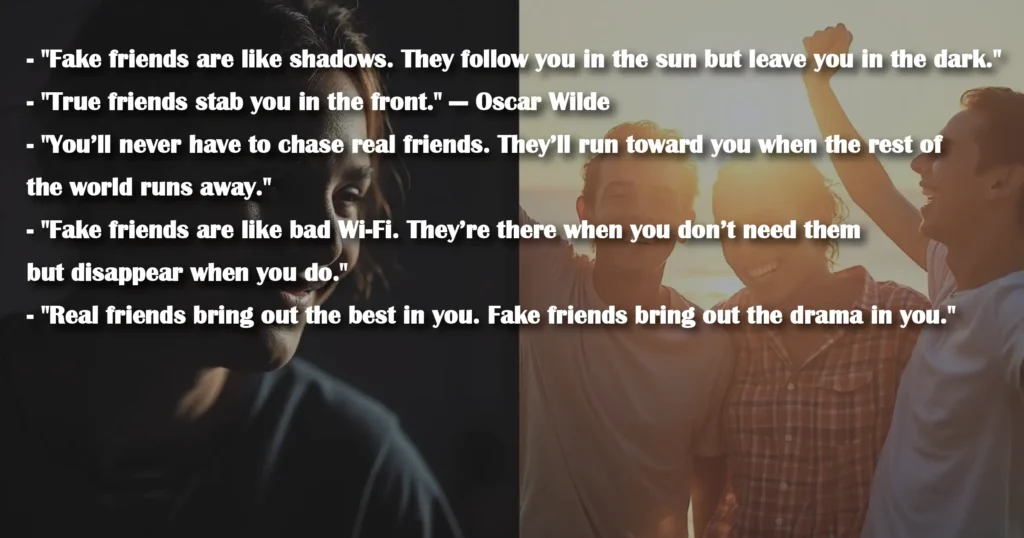
These quotes hit close to home because they highlight the emotional truths we all face in relationships. Fake friends can teach us hard lessons about boundaries and self-respect. Meanwhile, real friends remind us of the beauty and depth of authentic connections.
Funny Fake Friends Quotes
Humor can be one of the best remedies for the sting of betrayal. Fake friends may hurt you, but finding the humor in their actions can give you back a sense of control and power. Laughter helps you process the absurdity of their behavior and reminds you not to take their actions—or their opinions—too seriously. After all, not every emotional battle needs to leave a scar.
Here are some witty and funny quotes to help you smile through the frustration of dealing with fake friends:
Funny Fake Friends Quotes
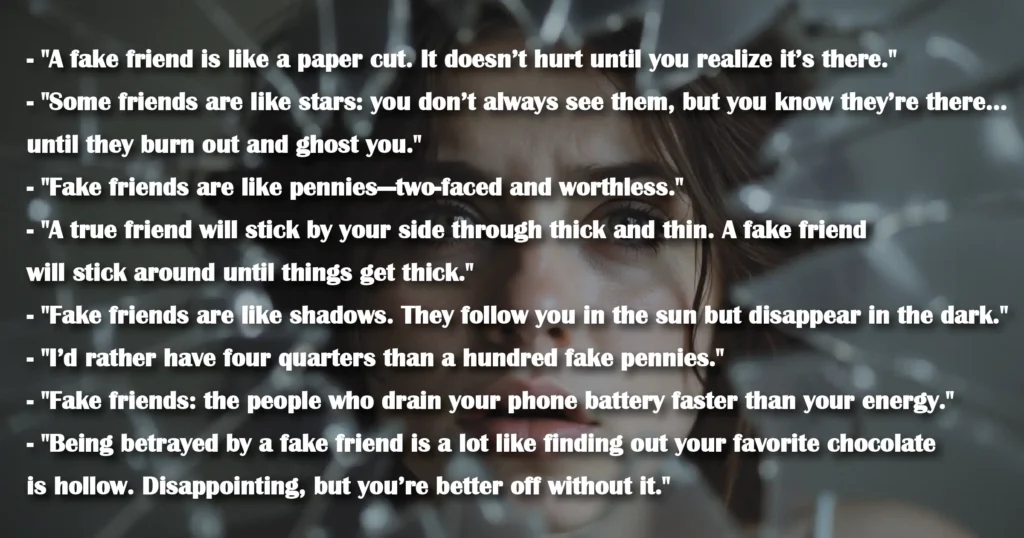
Humor doesn’t erase the hurt caused by fake friends, but it can shift your perspective. These quotes highlight the ridiculousness of fake friendships—how they often involve selfish, fleeting, and shallow behavior. When you can laugh at the absurdity, you take away their power over you.
The message here is clear: fake friends don’t define your worth or your ability to form real connections. They are a temporary lesson, not something permanent. By embracing humor, you can move forward with grace, leaving behind those who don’t deserve your time or energy.
Indirect Quotes for Fake Friends
Sometimes, words have power beyond confrontation. Indirect quotes can be a subtle yet impactful way to express your emotions about a fake friend, giving you the chance to vent your frustration without stirring unnecessary drama. They act as mirrors—reflecting your feelings and the situation—without having to call someone out by name.
Here are some poignant quotes that capture the sting of betrayal and the bittersweet realization of a fake friendship:
Indirect Fake Friend Quotes
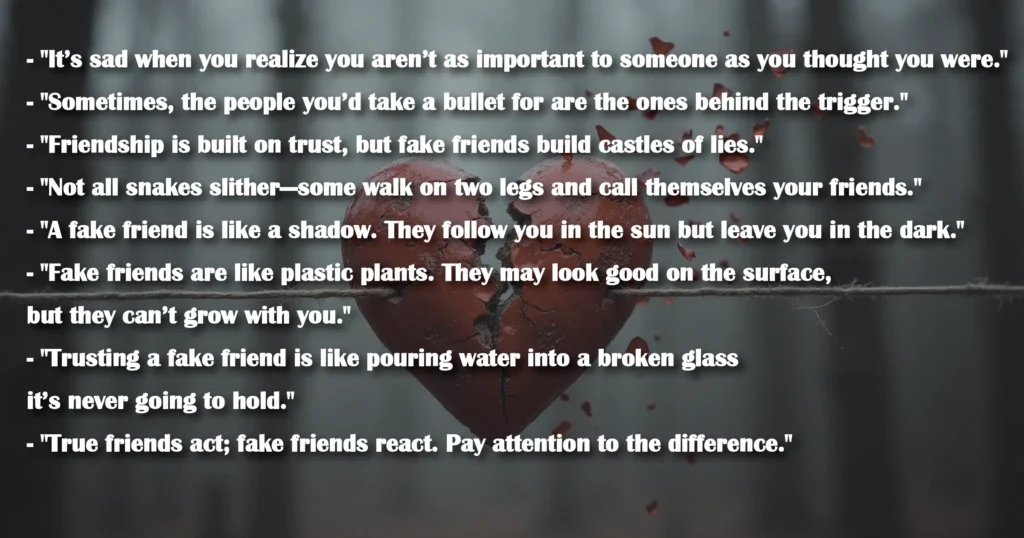
Each of these quotes paints a vivid picture of the emotional toll fake friends can take. They resonate deeply because they stem from shared human experiences of betrayal, disappointment, and unbalanced effort in relationships. What’s powerful about indirect quotes is their ability to validate your feelings without directly escalating conflict.
Fake Friends in Different Situations (Work, School, etc.)
Fake friends don’t only exist in personal circles—they can infiltrate work and school environments too. Whether it’s a coworker who pretends to support you or a schoolmate who smiles in your face but talks behind your back, fake friends can create toxicity in any area of life.
Work Fake Friends Quotes
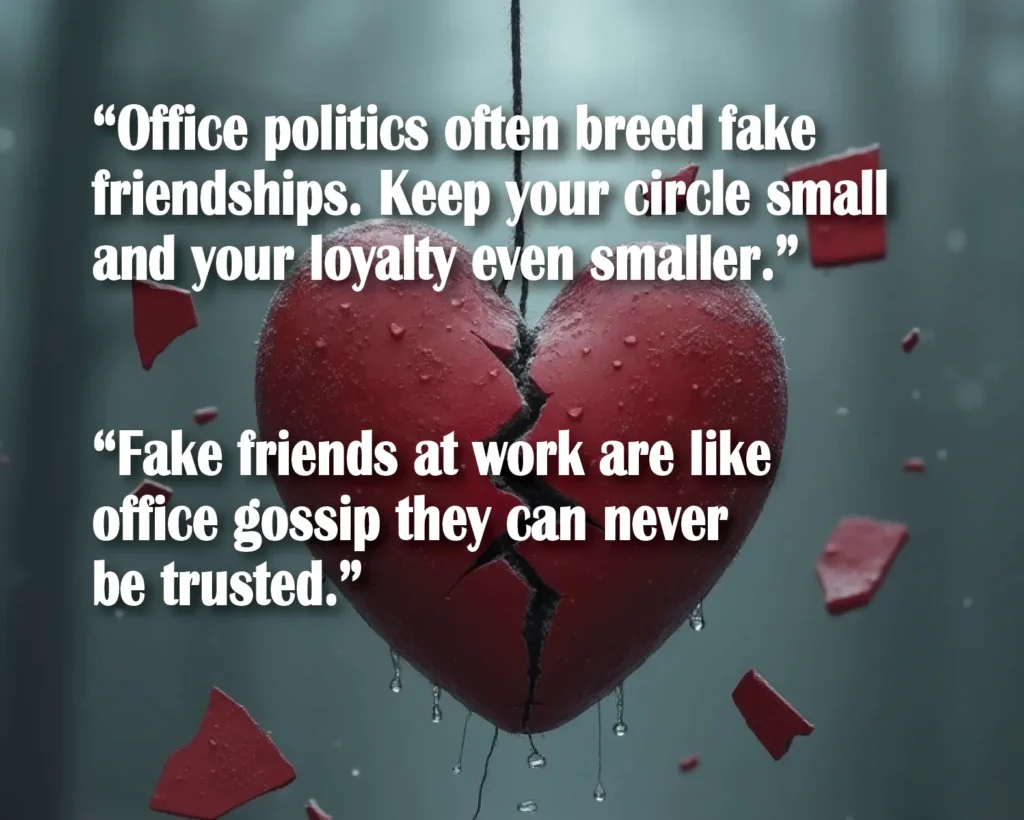
School Fake Friends Quotes
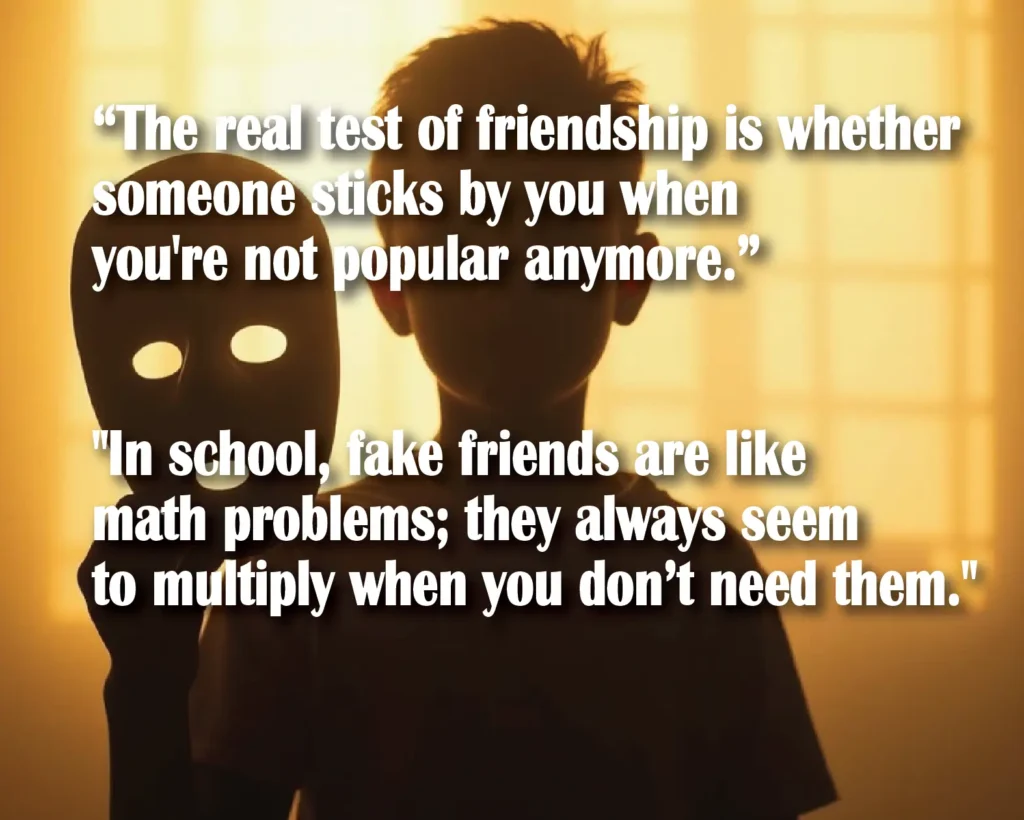
These quotes help you navigate toxic relationships that may exist in your professional or academic settings, giving you the clarity to distance yourself and focus on building real connections.
Final Thoughts
Fake friends are a harsh reminder that not everyone who enters our lives deserves a permanent place in it. The sting of betrayal, the weight of disappointment—it’s painful, but it’s also an opportunity. Recognizing the signs of a fake friend and taking steps to protect your peace isn’t just about cutting ties; it’s about reclaiming your emotional well-being.
Each experience with a fake friend can teach you something valuable: how to set boundaries, trust your instincts, and prioritize the relationships that genuinely uplift you. The road to stronger, healthier connections begins with knowing your worth and refusing to settle for less.
Additional Resources for Navigating Fake Friendships
- Psychology Today – Dealing with Toxic Relationships
Learn to identify toxic dynamics and how to respond effectively. - Verywell Mind – How to Deal with Fake Friends
Practical tips for navigating difficult friendships with confidence. - HelpGuide – Building Healthy Relationships
Explore strategies to cultivate meaningful and supportive connections.
A Final Note
Your heart deserves genuine connections—the kind of friends who show up, cheer you on and stand by you even when life gets messy. The journey to finding those true friends might involve letting go of a few fake ones along the way, and that’s okay. Each experience shapes your understanding of what real friendship should feel like: mutual, supportive, and full of trust.
So take care of your heart. Embrace the lessons learned, lean into the relationships that truly matter, and remember—you’re not alone in this. True friends are out there, ready to walk beside you on life’s rocky roads.
Check our quotes section for updated collections of inspiring quotes!

